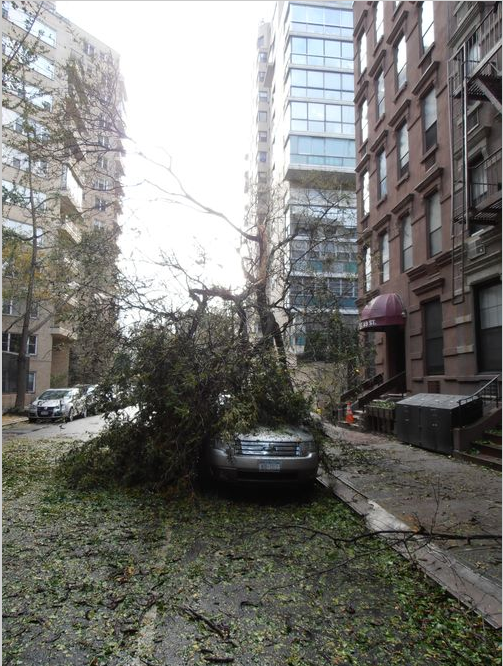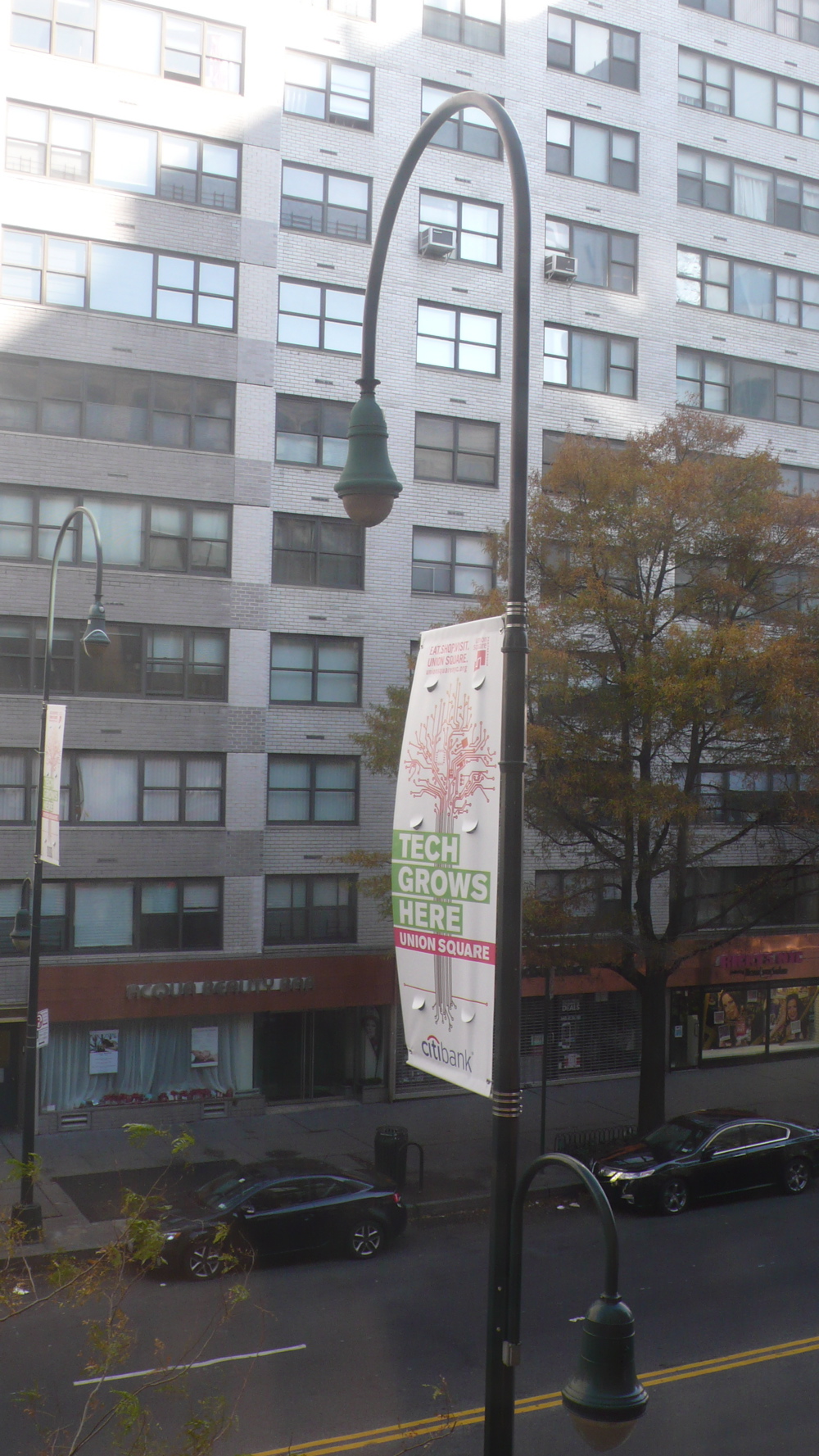We hadn’t expected any serious troubles while viewing the TV news warnings of Hurricane Sandy. A year ago there was a hurricane in New York also, but in Manhattan it was almost unnoticeable.
This time it was different.
On November 29 at 8:30pm electricity went off in Lower Manhattan. From the vantage point of our windows on West 14th Street, the city, with the sky covered by the heavy clouds, disappeared in darkness.
And almost at the same moment I heard terrible sounds from the street, reminding me of bombs exploding. The source turned out to be the wind playing with the banner hanging on a lamp post in front of our windows. The “explosions” went on for about an hour and a half. Then the wind tore the banner off lamp post and threw it onto branches of a nearby tree.
Without electricity, my wife and I immediately lost almost all our connections with the outside world: TV, Internet, telephone – nothing could work without electricity.
Our only stove is electric. So we lost the possibility to prepare hot food or even hot tea and coffee. We had bought and prepared in advance some food to survive for several days if need be. But with refrigerator not working, the food spoiled very fast despite the very low temperature in our place. Moreover, heating went off and hot water stopped flowing from the faucet.
We had an old small FM radio, prepared for such case, working on a battery. Thanks to this radio we could get the latest news.
We had some experience with blackouts before, so we had some candles, matches, flash lights and batteries. But the past blackouts have usually never been very long. So our reserves of candles and batteries were soon exhausted.
First evening we spent sitting dressed up in all our warm clothes, listening to the radio and trying to read with two candles. A very dark and cold night followed.
In the morning I went out.
Luckily we live on the second floor. We have a friend – an elderly woman with a knee problem – who lives on 16th floor a block from us. Elevators didn’t work. Only on the third day after the hurricane were her grand children able to get to her apartment and help her walk down.
I made a long walking tour through the Village. The streets were blocked with broken trees; otherwise it was very peaceful.

All stores and restaurants were closed except for a 24 hour Deli not far from us, which had a generator. The Deli owners were selling hot coffee. I joined the long line and in 20 minutes got my cup.
This coffee source survived only one day. On the second day I was told that the generator could only provide enough electricity for brewing coffee. So instead, the Deli owners started allowing people to charge their cell phones for free.
My further explorations revealed two more places selling hot coffee and three restaurants lit with candles serving hot ethnic food cooked on coal grills and wood stoves. There were no lines to get to those expensive places. But they were full with patrons.
By the second night our reserves of candles and batteries were exhausted. Needless to say that walking from bedroom to bathroom at the cold night in the complete darkness presented a real problem.
It wasn’t easy to locate candles and batteries in Manhattan on the third day after the hurricane. It took my wife several hours of walking to and through Midtown till she was able to find a store where these sought after items were still available.
The more days passed after the hurricane, the more areas of Manhattan were getting back electric power. On the third day electricity returned to all blocks to the North of 33rd Street. My wife and I were really cold and in need of hot liquids and food. So we decided to walk north from 14th Street and Broadway to find a working restaurant.
The first working coffee shop we found was on the corner of 34th Street and 7th Avenue. There was a long line to get to the coffee shop. We joined the line and finally were brought to a table. Being immigrants from Russia, we speak Russian to each other. To our surprise the waitress joined our Russian conversation. She turned out to be a new immigrant from Samara, a small Russian provincial town.
After lunch we went to pay the cashier. The cashier also started speaking Russian to us. Thanks to the hurricane, we experienced how large is the recent immigration from Russia.
In several days we discovered that one of our telephones had started working. We couldn’t hear the buzz when somebody called us, since the bell didn’t work without electricity, but we could call other people.
We learned that our situation was not so bad compared to others. People who lived near the ocean went through the real turmoil. My brother’s house in Long Island was completely destroyed.
Several days without hot food and shower made us search for a possibility to use some facilities of our friends living uptown, who had electricity and whom we could reach by walking and the transportation that was returning to life uptown.
We had several such friends. Calling them, we discovered that each of them already had guests staying with them day and night. All of them sheltered several friends and relatives each, with 5-7 people crowded into an apartment normally lived in by one or two. They urged us to come; nevertheless, we decided that it wouldn’t be proper to impose on people who already were living under extreme crowding conditions.
Our life without power lasted a week. We survived, and learned to be better prepared for the surprises of nature.
By now all the traces of the hurricane are eliminated in our area. A new banner took the place of the old one. The banner hangs peacefully, waiting for a new disaster.


